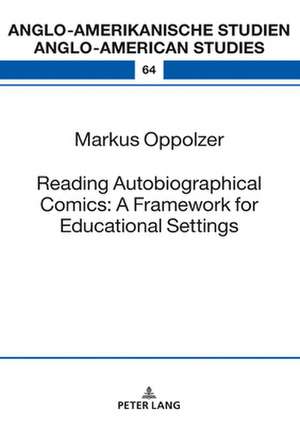Reading Autobiographical Comics: A Framework for Educational Settings: Anglo-Amerikanische Studien - Anglo-American Studies
Autor Markus Oppolzeren Limba Engleză Hardback – 29 apr 2020
This book updates reader-response criticism as the foundation of aesthetic reading in the classroom by bringing it in line with cognitive theories in literary studies and linguistics. With the help of Gilles Fauconnier and Mark Turner's conceptual integration theory, which shares a surprising number of correspondences with Wolfgang Iser's The Act of Reading, it is possible to flesh out the latter's model of narrative meaning-making. In turn, this allows for a consistent reader-response approach to the medium of comics and auto/biography as one of its dominant genres. The fragmentation of comics narratives, but also of human lives and identities, requires such a theory that can explain how different perspectives and experiences can be blended into an experiential whole.
Preț: 680.27 lei
Preț vechi: 883.47 lei
-23% Nou
130.18€ • 135.14$ • 108.55£
Carte tipărită la comandă
Livrare economică 24 martie-07 aprilie
Specificații
ISBN-10: 3631810881
Pagini: 504
Dimensiuni: 148 x 210 mm
Greutate: 0.81 kg
Editura: Peter Lang Copyright AG
Seria Anglo-Amerikanische Studien - Anglo-American Studies
Notă biografică
Markus Oppolzer is an associate professor of teaching English as a foreign language (TEFL) and English literary studies at the University of Salzburg, Austria. His main research areas are autobiographical comics, visual narrative media in the classroom and multiliteracies.
Cuprins
1 Reader-Response Criticism
1.1 Reading as a Journey
1.2 Rosenblatt's Transactional Theory
1.3 Frames
1.4 Iser's Model of Meaning-Making
1.5 The Overdetermination of Literary Texts
2 Transaction in Educational Settings
2.1 The Ease of Reading
2.2 The Teacher of Literature as a Facilitator
2.3 Reading in Stages
Stage 1: Framing
Stage 2: Reading
Stage 3: Think-Tank
Stage 4: Lockstep
Stage 5: Rereading
Stage 6: Conclusions
Stage 7: Closure
2.4 Learner Texts & Activities
3 Cognitive (Literary) Studies
3.1 The Return of the Reader
3.2 Mental Models
3.3 Emotions & Empathy
3.3.1 The Feeling of What Happens
3.3.2 Types of Reading-Related Feelings
3.3.3 Transportation
3.3.4 Empathy
3.4 Embodied Cognition & Enactivism
3.5 Conceptual Metaphors & Blending
3.5.1 Basic Principles
3.5.2 Metaphors
3.5.3 Metonymies
3.5.4 Blending
3.6 Blending & Literary Studies
4 Cognitive Approaches to Comics
4.1 Synopsis
4.2 Definitions
4.3 Cartooning
4.4 An Art of Tensions
4.4.1 Words vs. Images
4.4.2 Image vs. Series/Sequence
4.4.3 Sequence vs. Page
4.4.4 Experience vs. Object
4.5 A Cognitive Reading of Craig Thompson's Blankets (Chapter I)
5 Autobiographical Comics
5.1 The Conceptual Ambiguity of Autobiography
5.1.1 A Struggle with Definitions
5.1.2 A Brief History of Autographics
5.1.3 Autographical Challenges to Autobiographical Genre Theory
5.2 Life Writing & Blending
5.2.1 The Autobiographical Act as Blending
5.2.2 Developing Autobiographical Reasoning
5.2.3 Autobiographical Memory
5.2.4 Photographic Evidence
5.3 Authenticity & Emotional Truth
5.4 Autobiographical Selves
5.5 Embodiment & Enaction
5.6 Types of Autobiographical Comics
Conclusion
List of Illustrations
Bibliography









